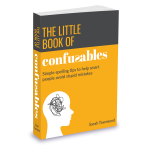Two become one: compound words and how to use them

In the process of writing a brochure for a financial services client, I found myself with a dilemma. Do I write healthcare, health-care or health care?
Ahh, those tricky compound words… are they one word, two words or hyphenated?
Let’s start at the beginning.
What is a compound word?
A compound word occurs when two or more words are joined to create a new or combined meaning.
There are three types of compound word:
- open compounds
- closed compounds
- hyphenated compounds
Open compounds, closed compounds and hyphenated compounds: what’s the difference?
What is an open compound word?
Open compounds are written as two separate words. Here are some examples:
- ice cream
- door frame
- full moon
- dining table
- coffee mug
- phone call
- test tube
- first aid
What is a closed compound word?
Closed compounds are written as one word, like this:
- sunflower
- toothbrush
- moonlight
- fireplace
- notebook
- flowerpot
- redhead
- teacup
What is a hyphenated compound word?
A hyphenated compound occurs when two or more words are joined by one or more hyphens. Here are some examples:
- self-confidence
- mother-in-law
- check-up
- train-spotter
- half-mast
- pre-dinner
- non-starter
- ex-husband
The tale of the incredible disappearing hyphen…
Many words that begin as hyphenated compounds become so commonplace that the hyphen ends up being dropped – it’s a natural part of the evolution of the English language.
For example, all these words started off with a hyphen (and some dictionaries still use one):
- online
- mindset
- proofreader
- secondhand
According to a 2007 article published by Reuters, the OED dropped 16,000 hyphens in its sixth edition of the Shorter Oxford English Dictionary.
Some hyphens disappeared from compound nouns, which became a single word (for instance, pigeon-hole became pigeonhole, chick-pea became chickpea and bumble-bee became bumblebee) while other compounds, such as ice cream and test tube lost their hyphen and became two words.
In the article, the dictionary’s editor, Angus Stevenson, explains that the hyphen’s demise reflects current usage: “We have been tracking this for some time and we’ve been finding the hyphen is used less and less.”
Care to make any predictions on what could be next? With the growth of online shopping, I predict that next-day – in the context of next-day delivery – will become nextday. Sure, it looks wrong now, but give it five years
Using hyphens in compound adjectives
When two words are joined to modify a noun (forming a compound adjective) and are placed before the noun, they’re usually hyphenated, but take care – when the same two words are placed after the noun, they don’t need a hyphen.
For example:
- “Benefit from a tax-free lump sum” BUT “the proceeds are tax free”
- “Fresh from our in-store bakery” BUT “you’ll find bread in store”
- “She has a long-term illness” BUT “her symptoms will improve in the long term”
Advanced tip
An exception to this rule applies when the compound adjective is formed using an adjective that ends -ly, in which case it’s always written as two separate words with no hyphen.
Here are some examples:
… a successfully applied formula
…a newly formed group
…a widely used tool
Compound words vs portmanteau words
So, is a compound word the same as a portmanteau*?
Nope. Here’s why.
Sometimes called a blend, a portmanteau is a new word that’s formed from part of one word and part of another, like this:
Brunch = breakfast + lunch
Sitcom = situation + comedy
Smog = smoke + fog
*According to the OED, Lewis Carroll was the first to use the term portmanteau in this way in Through the Looking-Glass (1871). Here, Humpty Dumpty explains to Alice the portmanteau word, in which “two meanings are packed up into one word”. (His description comes from portmanteau – a large bag – which is itself a blend of the words porter and mantle.)
Compound words in British English vs US English
In the process of researching this article, I came across many words spelled differently in different dictionaries. Generally speaking, British English dictionaries tend to be more cautious – clinging on to the hyphen (mouth-watering) when US English has dropped it (mouthwatering).
So, if you’re not sure of the current recommended spelling of a compound word, check your favourite online dictionary. Just don’t be surprised if they don’t always agree…
No more confusing words!
Master 600 confusing words with The Little Book of Confusables: 300 gorgeous pages packed with memorable, fun spelling tips – from ACCEPT + EXCEPT to YOUNG + YOUTHFUL.


